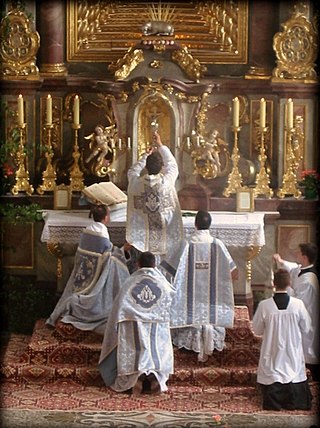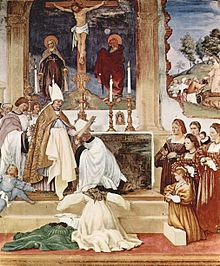
The Tridentine Mass, also known as the Traditional Latin Mass, the Traditional Rite, or the Extraordinary Form, is the liturgy in the Roman Missal of the Catholic Church codified in 1570 and published thereafter with amendments up to 1962. Celebrated almost exclusively in Ecclesiastical Latin, it was the most widely used Eucharistic liturgy in the world from its issuance in 1570 until the introduction of the Mass of Paul VI.
The collect is a short general prayer of a particular structure used in Christian liturgy.
Low Mass is a Tridentine Mass defined officially in the Code of Rubrics included in the 1962 edition of the Roman Missal as a Mass in which the priest does not chant the parts that the rubrics assign to him. A sung Mass celebrated with the assistance of sacred ministers is a High or Solemn Mass; without them it is a Missa Cantata.

Intercession of the Saints is a Christian doctrine that maintains that saints can intercede for others. To intercede is to go or come between two parties, to plead before one of them on behalf of the other. In ecclesiastical usage both words are taken in the sense of the intervention primarily of Christ, and secondarily of the Blessed Virgin and the angels and saints, on behalf of men. The doctrine is held by the Catholic, Eastern Orthodox Churches, the Assyrian Church of the East, the Oriental Orthodox churches, and some Lutherans and Anglicans. The practice of asking saints for their intercession can be found in Christian writings from the 3rd century onwards.
A memorial in the Roman Rite of the Catholic Church is a lower-ranked feast day in honour of a saint, the dedication of a church, or a mystery of the religion.
Litany, in Christian worship and some forms of Jewish worship, is a form of prayer used in services and processions, and consisting of a number of petitions. The word comes through Latin litania from Ancient Greek λιτανεία (litaneía), which in turn comes from λιτή (litḗ), meaning "prayer, supplication".
In the Latin liturgical rites of the Catholic Church, a commemoration is the recital, within the Liturgy of the Hours or the Mass of one celebration, of part of another celebration that is generally of lower rank and impeded because of a coincidence of date.
A Dialogue Mass is a Low Mass wherein the people recite some parts of the Latin Tridentine Mass.
The ordinary, in Catholic liturgies, refers to the part of the Mass or of the canonical hours that is reasonably constant without regard to the date on which the service is performed. It is contrasted to the proper, which is that part of these liturgies that varies according to the date, either representing an observance within the liturgical year, or of a particular saint or significant event, or to the common which contains those parts that are common to an entire category of saints such as apostles or martyrs.

Simbang Gabi is a devotional, nine-day series of Masses attended by Filipino Catholics in anticipation of Christmas. It is similar to the nine dawn Masses leading to Christmas Eve practiced in Puerto Rico called Misa de Aguinaldo. Originally intended as a practical compromise for farmers that started working in the fields before sunrise, this cherished Christmas custom eventually became a distinct feature of Philippine culture and became a symbol of sharing.
A Catholic order liturgical rite is a variant of a Catholic liturgical rite distinct from the typical ones, such as the Roman Rite, but instead specific to a certain Catholic religious order.

The Mass is the central liturgical service of the Eucharist in the Catholic Church, in which bread and wine are consecrated and become the body and blood of Christ. As defined by the Church at the Council of Trent, in the Mass "the same Christ who offered himself once in a bloody manner on the altar of the cross, is present and offered in an unbloody manner". The Church describes the Mass as the "source and summit of the Christian life", and teaches that the Mass is a sacrifice, in which the sacramental bread and wine, through consecration by an ordained priest, become the sacrificial body, blood, soul, and divinity of Christ as the sacrifice on Calvary made truly present once again on the altar. The Catholic Church permits only baptised members in the state of grace to receive Christ in the Eucharist.

The Leonine Prayers, also known as Prayers after Mass, are a prescribed set of Catholic prayers for recitation by the priest and people after Low Mass required within the Roman Rite of the Latin Church from 1884 to 1965. The name derives from their introduction by Pope Leo XIII. They were slightly modified by Pope Pius X.
The General Intercessions or Universal Prayer or Prayer of the Faithful are a series of prayers which form part of the liturgy in the Catholic, Lutheran, Anglican, Methodist and other Western Liturgical Churches.

The Ambrosian Rite is a Latin Catholic liturgical Western Rite used in the area of Milan. The Traditional Ambrosian Rite is the form of this rite as it was used before the changes that followed the Second Vatican Council.

In Christian worship, Marian litany is a form of prayer to Mary, mother of Jesus used in church services and processions, and consisting of a number of petitions.
In the liturgy of the Catholic Church, a votive Mass is a Mass offered for a votum, a special intention. Such a Mass does not correspond to the Divine Office for the day on which it is celebrated. Every day in the year has appointed to it a series of canonical hours and a Mass corresponding, containing, for instance, the same collect and the same Gospel. On most days, the Mass will correspond to the Office, but on occasion, other Masses may be celebrated. Votive Masses appear in the Roman and Gallican Rites. The Suffrage Mass is a type of votive Mass that is celebrated in favour to some dead people.
The ranking of liturgical days in the Roman Rite is a regulation for the liturgy of the Roman Catholic church. It determines for each liturgical day which observance has priority when liturgical dates and times coincide, which texts are used for the celebration of the Holy Mass and the Liturgy of the hours and which liturgical color is assigned to the day or celebration.
The Zaire Use, also called Zairean Rite, officially the Roman Missal for the Dioceses of Zaire, is a Congolese liturgical use of the Roman Rite within the Catholic Church. Approved by the Vatican in 1988, it contains many elements from the Ordinary Form of the Roman Rite, but also incorporates elements from sub-Saharan African culture, particularly Congolese, including a number of inculturated liturgical modifications.

The First Fridays Devotion, also called the Nine First Fridays Devotion or the Communions of Reparation to the Sacred Heart, is a Catholic devotion in honor of the Sacred Heart of Jesus and to offer reparations for sins to the Blessed Sacrement. It has its origins in the apparitions of Christ at Paray-le-Monial, France, reported by Margaret Mary Alacoque in the 17th century. This devotion to the Sacred Heart was fully approved by the Roman Catholic Church and a "Great Promise" of final penance was made to those who practice the First Fridays Devotion.








